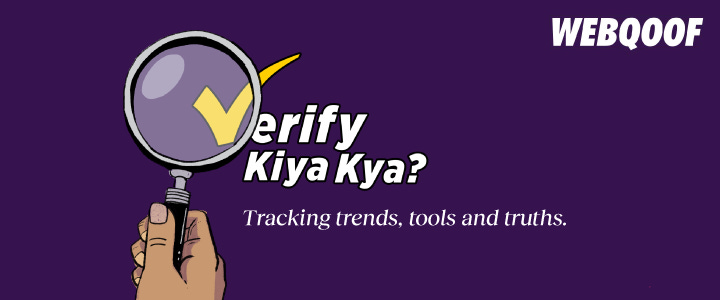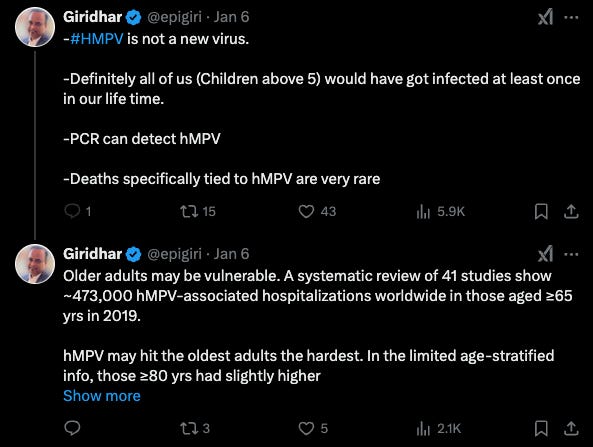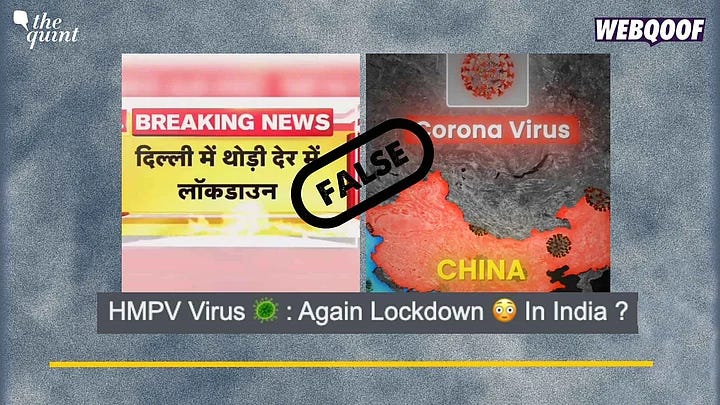The Need for Responsible Health Reporting in an Age of Misinformation
We need your support to continue our fight against irresponsible health reporting.
Dear Reader,
As the editor of The Quint’s fact-checking team, I tend to get panicky messages when there is news about an alleged health crisis or outbreak of a disease. That’s what happened in January when a close friend reached out, asking if they should cancel their vacation due to the HMPV outbreak.
This reminded me how health misinformation can spread more rapidly than even diseases. My experiences in debunking health misinformation in major projects during the COVID-19 pandemic and the vaccination drive have underscored that the challenge lies not only in debunking false claims but also in addressing the media's role in amplifying panic and speculation.
The Danger of Sensationalism
Headlines proclaiming a "new deadly virus" or the "next pandemic threat" are designed to attract clicks but often fuel unnecessary fear. Media outlets striving to stay ahead tend to prioritise engagement over accuracy, publishing speculative reports before all facts are established. This pattern was evident during the recent Guillain-Barré Syndrome (GBS) outbreak in India and the surge of Human Metapneumovirus (HMPV) cases in China.
In early 2025, reports emerged of a GBS outbreak in Pune, Maharashtra, with over 180 suspected cases and six deaths. Some media outlets, in a rush to report, used alarming language that heightened public anxiety. For instance, headlines referred to a "mysterious brain-damaging disease" causing deaths and leading to quarantines, which, while attention-grabbing, lacked context and specificity.
Similarly, the rise in HMPV cases in China led to sensational headlines suggesting a new pandemic threat. Mainstream news organisations like Hindustan Times, Times Now and Economic Times published reports likening HMPV to the COVID-19 pandemic. It’s worth reminding that countless Indians lost loved ones to the COVID-19 pandemic — and such clickbait headlines can create panic.
Experts, such as renowned epidemiologist Giridhar R Babu, highlighted that while HMPV can cause severe illness in young children, the elderly, and immunocompromised individuals, it does not pose the same threat level as novel pathogens like SARS-CoV-2.
The World Health Organisation stated that the increase in respiratory infections in China was within expected seasonal patterns, urging against unnecessary alarm.
Role of Fact-Checkers in Correcting the Narrative
Fact-checkers have worked diligently to debunk false claims surrounding health crises. During the GBS outbreak, misinformation circulated linking the syndrome directly to chicken consumption, causing unwarranted fear among the public. While Campylobacter jejuni, a bacterium often found in undercooked poultry, is a known trigger for GBS, the outbreak in Pune was primarily associated with contaminated water sources, not poultry consumption. Clarifying such nuances is crucial to prevent unnecessary panic and economic fallout for local industries.
In the case of HMPV, fact-checkers and responsible health reports, like the one published on The Quint, emphasised that the virus is not new and that its seasonal surge is common during winter months.
Several fact-checking organisations, such as The Healthy Indian Project, also put out stories clarifying the same. However, while fact-checkers' role in providing this context helped alleviate public fears and corrected the sensational narratives circulating in the media, they can’t come close to the reach of such mainstream organisations.
Moreover, bad actors used the panic created by news organisations to spread further misinformation by using old and unrelated videos to show the “real situation” in China, claiming that India was about to go into a lockdown due to the HPMV outbreak. The Quint’s fact-checking team, WebQoof, also fact-checked some of these claims.
Fact Check: False Claims About COVID-like Lockdowns Due to HMPV Viral
What Journalists and Newsrooms Can Do Better
Verify Before You Amplify: Journalists must thoroughly verify claims before publication. In the case of health scares, consulting medical professionals and epidemiologists is essential to provide accurate information.
Avoid Sensational Language: Terms like "mysterious disease" or "brain-damaging illness" can evoke undue panic. Using precise language that reflects the scientific understanding of the situation helps maintain public trust.
Provide Context: Reporting the number of cases without context can be misleading. Including information about the rarity of the condition, potential causes, and preventive measures offers a more comprehensive understanding.
Follow-up on Initial Reports: Continuous updates with new findings and corrections are vital. In the GBS outbreak, as investigations identified contaminated water as the source, reporting this development helped redirect public concern appropriately.
Collaborate with Fact Checkers: Engaging with fact-checking organisations can aid in verifying medical claims before publication, ensuring that accurate information reaches the public.
The recent GBS outbreak and the HMPV surge highlight the critical role of responsible health reporting. Misinformation can lead to fear, stigmatisation, and misinformed health choices. Journalists and editors must reflect on whether their reporting contributes to informed decision-making or merely chases sensationalism.
Until then, we will need your support to continue our fight against misinformation and debunking such irresponsible health reporting. Consider contributing to our work*.
Stay informed and don't be a WebQoof!
ABHILASH MALLICK
Editor, Fact-Check
Also Read:
*Already a member of The Quint? What a star! Your support empowers us to question everything.
Want us to cover a story? Write to us at editor@thequint.com or reply to this email.








